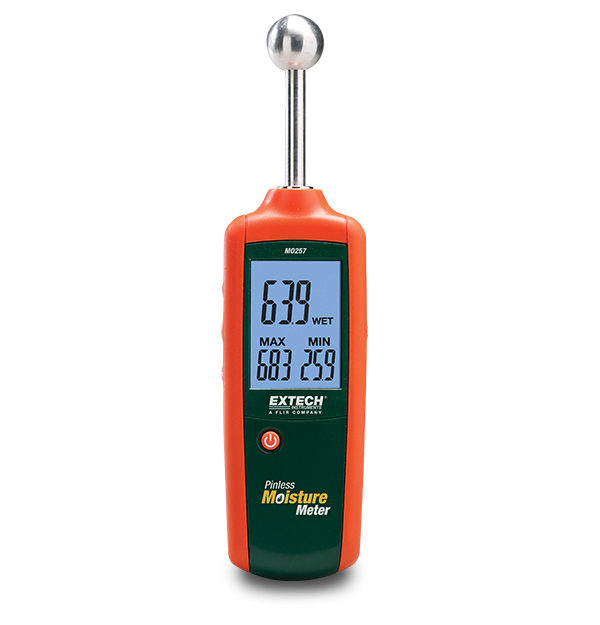Moisture Meter Reviews: Contrasting the most effective Versions for Professional and DIY Use
Moisture Meter Reviews: Contrasting the most effective Versions for Professional and DIY Use
Blog Article
The Ultimate Guide to Moisture Meters: A Comprehensive Summary and How They Can Save You Cash
In the world of structure maintenance, building, and various markets, the relevance of accurately determining moisture levels can not be overemphasized. Dampness meters offer as crucial devices in finding and monitoring moisture web content in products, helping in preventing pricey problems and guaranteeing the high quality of items. Recognizing the nuances of various sorts of moisture meters, their applications, and the potential cost-saving advantages they provide can be a game-changer for experts and companies alike. Discovering just how these devices can not just improve procedures yet likewise add to economic savings is a trip worth embarking on.
Sorts Of Moisture Meters
One usual type is the pin-type wetness meter, which measures the electrical resistance in between 2 pins inserted into a material. Pinless dampness meters, on the other hand, use electro-magnetic sensing unit plates to check a larger location without creating damage to the material's surface.
Infrared moisture meters gauge the thermal residential properties of a product to determine its moisture content non-invasively, making them valuable for applications where pin or pinless meters might not be appropriate. Comprehending the various types of moisture meters available can aid sectors select the most proper device for their particular moisture dimension requirements.

Advantages of Utilizing Moisture Meters

Furthermore, using moisture meters can lead to boosted energy performance. In farming settings, wetness meters play a crucial duty in maximizing plant returns by allowing farmers to keep track of soil dampness degrees and make educated watering decisions.
Exactly How to Select the Right Moisture Meter
Picking the proper wetness meter involves taking into consideration vital elements such as material compatibility, dimension variety, and calibration accuracy. When picking a wetness meter, it's vital to guarantee that the meter is ideal for the particular product you will be testing. Various products have varying electrical residential or commercial properties that can affect wetness readings, so selecting a meter designed for your product is important for exact results. Additionally, think about the measurement variety of the dampness meter. Make sure that the meter can spot dampness levels within the variety required for your applications. Calibration precision is another important element to remember (Moisture Meter). Go with a wetness meter with trustworthy calibration to ensure exact and consistent readings. Some meters might need routine calibration adjustments, so comprehending the calibration procedure is essential. By meticulously reviewing these elements, you can select a dampness meter that meets your requirements and supplies accurate dampness measurements for your jobs.
Appropriate Strategies for Moisture Meter Usage
To guarantee precise dampness readings and make the most of the efficiency of a dampness meter, using proper techniques is necessary. When using a pin-type wetness meter, put the pins or probes right into the see this here product being examined until they make full contact. Guarantee the pins are vertical to the surface area to obtain one of the most exact analysis. For pinless moisture meters, hold the gadget flat versus the material and relocate slowly to cover the entire location for an ordinary analysis. It's crucial to calibrate the moisture meter according to the material being tested to improve precision. Take numerous analyses throughout the surface and typical them out for a much more reputable outcome. In addition, make certain that the product being examined is acclimated to the environment to stop skewed readings. Normal upkeep of the wetness meter, such as cleaning up the pins or sensor, is also vital to guarantee exact and constant readings. By following these appropriate methods, users can rely on their dampness meter to supply reliable wetness levels, aiding in protecting against expensive damage or ensuring top quality in numerous applications.

Price Financial Savings With Moisture Meter Applications
Exactly how can the critical use of dampness meters lead to significant cost savings across different sectors? In the farming industry, wetness meters help in establishing the optimum time for harvesting crops, avoiding over-drying or excess wetness that can impact the final product's high quality.

Furthermore, in the food processing industry, moisture meters are vital for keeping an eye on item high quality and making sure compliance with safety policies. By precisely determining moisture content in food, manufacturers can prevent wasting, keep quality, and minimize waste, leading to considerable expense savings. Overall, the tactical application of moisture meters is a useful financial investment that can cause substantial cost decreases and enhanced efficiency across numerous industries.
Conclusion
To conclude, dampness meters are useful tools for discovering and measuring wetness degrees in different materials. By making use of the ideal moisture meter and adhering to appropriate techniques, customers can efficiently prevent pricey damages created by excess wetness. Investing in a top quality wetness meter can lead to substantial price financial savings in the future YOURURL.com by recognizing prospective concerns early and enabling punctual remediation. Inevitably, dampness meters are important instruments for keeping the stability and long life of products and structures.
Moisture meters serve as indispensable tools in identifying and keeping an eye on moisture web content in materials, aiding in stopping pricey problems and ensuring the quality of items. Infrared dampness meters measure the thermal buildings of a product to determine its moisture content non-invasively, making them useful for applications where pin or pinless meters may not be ideal.Dampness meters use indispensable benefits in accurately assessing and keeping an eye on dampness degrees in varied products and environments. In agricultural settings, dampness meters play a critical duty in maximizing crop yields by making it possible for farmers to keep an eye on dirt wetness levels and make educated irrigation choices.In final thought, dampness meters are important tools for determining and identifying dampness levels in various materials.
Report this page